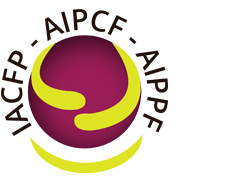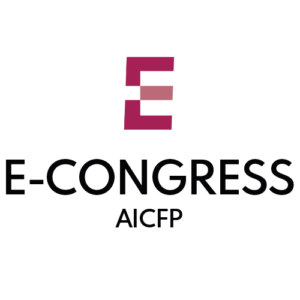Each morning, the video and text recordings corresponding to the day will be put online and will remain accessible “on demand” until the end of the E-Congress.
IACFP E-CONGRESS 2020
October 21-25, 2020
ONLINE
[3d-flip-book mode=”fullscreen” urlparam=”fb3d-page” id=”7271″ title=”false”][/3d-flip-book]
INSTRUCTION FOR USE
Here are some explanations of how it works:
The live sessions will be only the opening and the closing session. All the rest will be either recorded, either written. All the plenaries will be video, all workshops written. They will be available at any hour, there will not be a certain slot of time. Each participant can access at the suitable time for him and as many times as he wants. The interaction between participants and authors will be possible through private facebook discussion groups, the participants can write comments and address questions. There will be discussion groups coordinators linking the participants and the authors and providing responses to the formulated questions.
The website will offer to the participants all necessary indications for how to proceed to have access to the papers and discussion groups. There will be indications for all three languages.
Argument
Since its foundation as a practice and theory, the psychoanalysis of couples and families has constantly sought to produce, from the Freudian and post-Freudian corpus, advances in the deepening of its tools and in the extension of its field. The previous IACFP Congresses have largely reported on this. They have allowed us to open up, with satisfaction and sometimes concern, to the great diversity of clinical situations encountered and the treatment devices they require.
In recent years, couples and families, as well as psychoanalyst therapists, have also been confronted, in the contemporary world, with changes that affect the main categories of our understanding of the world, time, space, causality and anthropology. The accelerated rhythm of transformations disrupts the foundations of the tuning between subjective, personal and collective temporalities. Spaces and their borders seem to be shrinking, telescoping and thus exacerbating territorial rivalry.
Unexpected changes and catastrophic situations increase the need for causality, which then produces disconcerting but important statements in the clinic session to consider. As for the anthropology of the couple and the family, intertwining psychology and sociology, its rapid and profound restructuring disrupts our original relationship and reconfigures our treatment devices. Thus the contemporary world is overflowing with hopes but also with threats, at the risk of intensifying the trauma.
In this sociocultural context, which is sometimes hypercritical, the relevance of the foundation of our profession, the Unconscious, is confirmed and enriched by the psychoanalysis of couples and families, which articulates the three dimensions of the psychic, the subject, the link and the group. The many challenges of all kinds that are currently abounding and seek to invalidate our corpus are as many incentives to deepen our commitment to analytical work with the subject, the couple, the family and the institution.
This Congress proposes to explore the advances, inventions and obstacles that are also emerging in the clinical, theoretical, practical and operational aspects of our own institutions.
Possible themes
1/ Time
- The objective temporality, that of the clock, the same for everyone.
- Subjective, multiple and different temporalities: within each subject; within the psyche of the family group; within the socio-cultural environment. And in session.
- These temporalities, in tune or out of tune.
- The time envelope.
- The history (historization): of the cure; of the family; of the environment.
- What forms of historization, from associative narrative to “without history”, according to the relationship to trauma?
- The body and time.
- The uchrony (fictional time)
- The après-coup in a couple and family session.
- Devices and time: duration, rhythm, beginnings, endings.
- Attention, counter-transference and temporal complexity in session.
- The tyranny of emergency
- Changes in latency phase and family structure
2/ The space
- The objective space (the territory).
- Subjective spaces (maps); topical, multiple and different: of the subject, of the link, of the group.
- Limits, boundaries, envelopes.
- The placement in the session
- Displacement, migration, rootedness, rivalries, exclusion.
- Utopia.
- Multi-space devices.
- Attention, counter-transference and spatial, psychological and bodily complexity, in session.
- Virtual communication and family life.
- Virtual communication and session work.
- Multifamily treatment devices.
3/ Psychic causality
- Objective, scientific and/or religious causalities.
- Subjective causalities: their forms, their relationship to trauma.
- Causalities and cultures.
- Hasard.
- Attention and counter-transference to causal materials during the session.
- The cause, the fault, the origin.
- Effects of environmental threats on session work.
- Effects of “fake news” on the relationship to the truth during the session.
4/ Family Structure
- Alliances and objective/subjective filiations
- Siblings
- The transformations of the couple and the family.
- Reproductive modalities.
- Incest and incestuous.
- Families and contemporary pathologies: deficits of narcissism.
- Contemporary devices and variations of the couple and family.
- Attention and counter-transference to family structure changes.
5/ Psychoanalysis and the unconscious
- Our psychoanalytical corpus and our professional identity in a multi-referential and competitive world.
- Ideologies.
- Our institutions.
- New forms of trauma.
- Psychic withdrawal and environmental crisis.
- Social commitment and environmental crisis.
- Disillusionment in the community life.
- Changes in the devices, frameworks and rules of work during the session.




